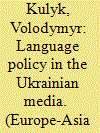| Srl | Item |
| 1 |
ID:
166600


|
|
|
|
|
| Summary/Abstract |
This essay examines the transformation of identity of Russian-speakers in independent Ukraine. Based on survey, focus groups and public discourse data, it explores the hierarchy of identities of those people who use predominantly Russian in their everyday lives and the meaning they attach to their perceived belonging to the Ukrainian nation. Although many scholars argued after the breakup of the USSR that Ukraine’s Russian-speakers would form into a community distinguished by its preferred language, the present analysis shows that they have instead been transformed from Soviet people into Ukrainians—and that without drastic changes in their language practice.
|
|
|
|
|
|
|
|
|
|
|
|
|
|
|
|
| 2 |
ID:
106041


|
|
|
|
|
| Publication |
2011.
|
| Summary/Abstract |
This article revisits the notion of linguistic diversity and its function as a political cleavage. It argues that people's linguistic and cultural attitudes are influenced not only by their communicative practice but also by their identification with particular language(s) - even though they may not always communicate in that language. In Ukraine, from which my empirical data is drawn, language identity is embodied in the concept of native language that was imposed by the Soviet institutionalisation of ethnicity and came to mean ethnic belonging as much as linguistic practice. My analysis of survey data demonstrates that native language is a powerful predictor of people's attitudes and policy preferences with regard to both language use and other socially divisive issues, such as foreign policy and historical memory. This finding should also be applicable to other societies with a large-scale discrepancy between language practice and identity.
|
|
|
|
|
|
|
|
|
|
|
|
|
|
|
|
| 3 |
ID:
122828


|
|
|
|
|
| Publication |
2013.
|
| Summary/Abstract |
This article deals with language policy in one crucial domain, the media. It treats language policy as the interaction between actions or inactions of the authorities, producers and consumers contributing to change or continuity of existing practices. It is argued that the main long-term contribution of all three actors, despite some notable changes, is the maintenance of the status quo characterised by the coexistence of Ukrainian and Russian with the predominance of the latter language. In particular, consumers mostly maintained their accustomed language preferences, although they did not resort to any protest actions when those preferences were disregarded.
|
|
|
|
|
|
|
|
|
|
|
|
|
|
|
|
| 4 |
ID:
146325


|
|
|
|
|
| Summary/Abstract |
The essay examines the impact of the Euromaidan protests and the subsequent Russian aggression on Ukrainian national identity. It demonstrates that national identity has become more salient vis-à-vis other territorial and non-territorial identities. At the same time, the very meaning of belonging to the Ukrainian nation has changed, as manifested first and foremost in increased alienation from Russia and the greater embrace of Ukrainian nationalism. Although popular perceptions are by no means uniform across the country, the main dividing line has shifted eastwards and now lies between the Donbas and the adjacent east-southern regions.
|
|
|
|
|
|
|
|
|
|
|
|
|
|
|
|